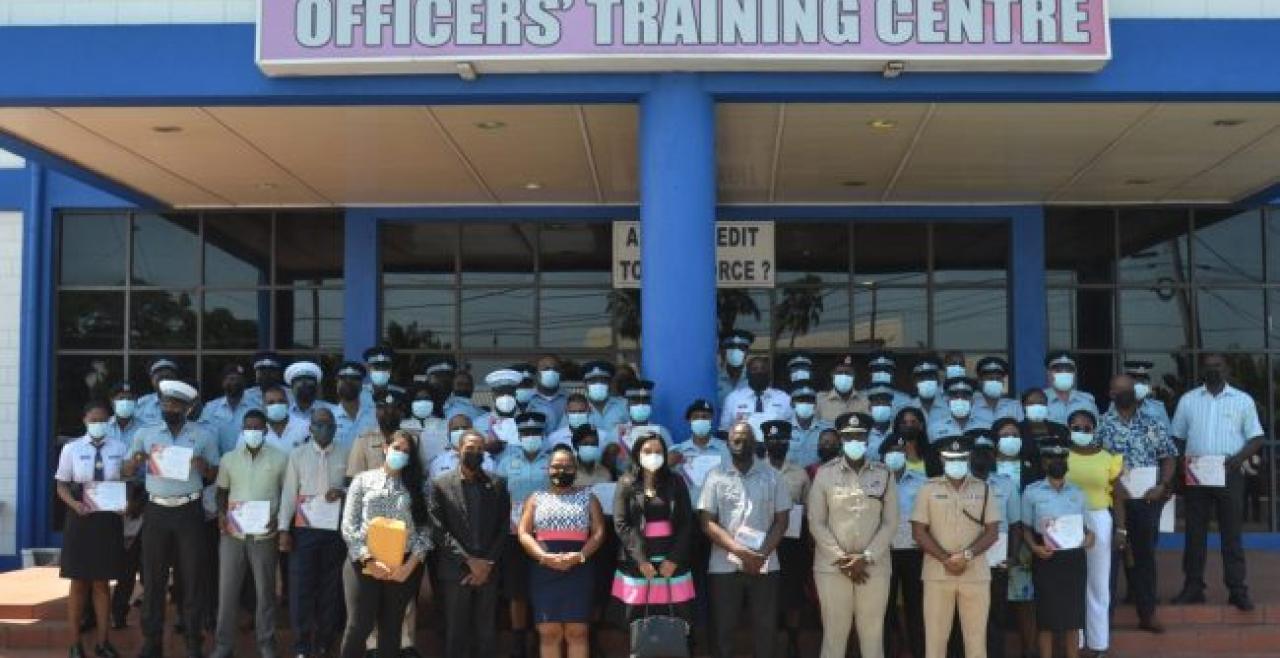Over 300 GPF officers undergo Gender-based Violence training

- As UNFPA recommences COPSQUAD2000
The United Nations Population Fund (UNFPA), in partnership with the Ministry of Human Services and Social Security (MHSSS), the Ministry of Home Affairs, and the Guyana Police Force (GPF), officially recommenced the COPSQUAD2000 initiative in January 2022. The initiative aims to build the capacity of GPF officers to effectively respond to Gender-Based Violence (GBV) cases. The first session for 2022 was hosted on January 27 at the GPF Officers’ Training Centre, Camp Road, and saw the participation of 49 police officers, which makes a total of 329 officers trained to date under the program.
Training under the COPSQUAD2000 Initiative commenced on August 24, 2021 to increase the national response to GBV by strengthening the Guyana Police Force’s capacity to prevent and respond to such instances. A projected 5,199 police officers from all divisions are expected to be trained by the end of the program, which will see weekly sessions being held in the three Police training centers and in the administrative regions that may not be accessing these sites. Initial training of Police officers was conducted directly by the UNFPA. This was subsequently paused in December to facilitate the Police in attending to their additional responsibilities during the busy December period. From January to June 2022, training has recommenced and is being facilitated with the support of consultants/ trainers recruited by the UNFPA.
The training program will improve the capacity of officers to practice confidentiality, effective interviewing techniques, safety and other survivor-centered protocols when dealing with GBV cases such as domestic violence, rape, Intimate Partner Violence (IPV), and sexual assault. The training sessions will take place at the Police Training Centers in Georgetown, Essequibo, and Berbice.
According to the Guyana Women’s Health and Life Experiences Survey (2019), one in every two women in Guyana has or will experience IPV in their lifetime. The national survey on gender-based violence in Guyana revealed that more than half (55 percent) of all women experienced at least one form of violence.
Recognizing the significant role that the GPF plays in responding to GBV, ensuring that perpetrators are brought to justice, safeguarding and protecting survivors and ensuring that survivors can access all other essential services such as medical care and safe accommodation, the role of the GPF is accepted as a core component of the multi-sectoral response to GBV in Guyana. This is especially so when taking into account the crucial role of the Police in, for instance, assisting survivors of IPV in obtaining protection orders, enforcing these orders, filing reports of IPV, laying charges against perpetrators, assisting survivors in accessing medical services for their injuries and in being moved to a safe place, preserving evidence, and informing survivors of their rights and of the services available to them.
ABOUT COPSQUAD 2000
COPSQUAD2000 is partially funded by the Spotlight Initiative with overseeing capacity from the UNFPA. In addressing GBV, particularly Violence Against Women and Girls (VAWG) in Guyana, it is necessary to provide survivors of GBV with timely access to quality comprehensive multi-sectoral services such as psychological/psychosocial support services, healthcare services as well as police and justice response services.
A total of 280 Police officers were trained in GBV as at December 31, 2021 to support the strengthened delivery of GBV essential services. The training was done under the Ministry of Human Services and Social Security COPSQUAD2000, with support under the Pillar 4 component of the Spotlight Initiative program. It is envisioned that by equipping police officers with these skills, this will assist in creating an environment that encourages survivors to report and create a positive cycle as more survivors will become comfortable reporting to the Police, allowing more survivors to have access to justice and for there to be less impunity for perpetrators.
